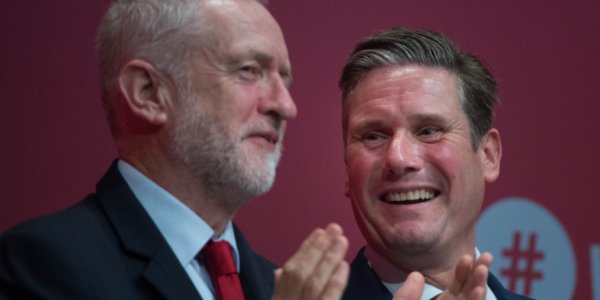
By M Ahmedullah, 30 June 2016 (Facebook posting)
As the current crisis of the Labour Party unfolds with an attempted coup against Jeremy Corbyn’s leadership, will the outcome, either way, save the Labour Party from a split or defeat at the next general election? One thing that seems to me to be a surety is that Labour will lose the next general election if it is held soon, either later this year or early next year.
The chance of the Party losing the next election has become even more probable due to the attack on Jeremy by fellow MPs, the vote of no confidence and the expected leadership challenge. Whether Labour will split is another matter, but probably not, as people from all spectrums of the Party will look at the face of the abyss and turn back, hoping to save the vast movement from further damage.
But there is no turning back on the process that started to unseat Corbyn’s leadership because it has moved to the point of no return. Only Jeremy’s resignation or a leadership election result will end the current destructive process. The British public will not vote for a party in shambles and disunited, especially when the Tories will have a smoother transfer of power and be presented as a much more united party.
If Jeremy wins the leadership contest, it is doubtful that the 80% of the Labour MPs who supported the no-confidence motion against him will come back united under his leadership. On the other hand, if a different candidate wins and Jeremy is unseated, then there will still be problems within the Parliamentary Labour Party, and the grassroots membership will be more divided than ever because the result is highly likely to be a very close one. Whatever way it goes, it looks bad for the Labour Party’s future, at least in the next few years.
So why is the Labour Party in such a crisis? There are many reasons, and the causes and factors are intertwined in complex ways. It means that when someone focuses on a particular aspect at a specific moment, because of the context of the time, someone may lose focus on other factors involved and their complex relationship with each other.
Some on the left who support Jeremy express nostalgia about past bold decisions by the Labour Party to create the NHS, Welfare State, Nationalisation, etc. They suggest a need for similarly bold, left-wing programmes to return to British politics. They believe that Blairites changing the Labour Party’s narratives in ways similar to the Tories and the right-wing of the British political spectrum have committed a grave sin and changed Labour Party’s traditional values and political programmes. And that if the Labour Party were to return to its left-wing roots, then the Party would become popular again with its own authentic identity. The renewed authentic vision will energise and help the Party win the next election and enable it to undertake bold programmes again, just like in the past.
Now, to me, this seems to be pure nostalgia and misguided. Living in the past will not help deliver victory to the Labour Party nor help us create a more just and fair society.
Sharp and fundamentalist ideological battles that are likely to generate from such nostalgia will be misguided and dangerous and certainly result in defeats after defeats. This is because fundamentalist analyses of wider social and economic problems are usually generalised from small life components with very little bearing on the wider complex reality. Consequently, their solutions turn out not to be real solutions either. Although they promise big things, they actually end up achieving very little.
A broad mix of policies and programmes is needed, underpinned by ideological perspectives shared by the broad Labour church and pragmatic considerations based on evolving society, human knowledge, economic relations, etc.
The hard-left perspectives and policy programmes are likely to be a disaster for Britain, although morally, they may sound reasonable and positive. But incentives that drive human beings to be creative and generate wealth through personal and group initiatives are usually killed off by the poison of the hard-left policies and perspectives. Although initially, the hard left promises generate some additional drive in some people who become inspired by the ideals of equality and justice, which results in the generation of wealth for a little while. But soon, they run out of steam because the power, drives and creativity of altruism cannot be a match against the force, drives and creativity of self-interest, especially as regulated self-interest generates a much better outcome for all.
The failed experiences and experiments of socialist and communist programmes across the world during the 20th century have shown that although their ideas are good and the best ideals for humanity but in reality, in many cases, they ended up achieving the opposite. It means that some of the ideals of socialism can only be achieved by abandoning certain programmes of the hard left and combining some of the fundamental principles of socialism with an element of regulated capitalism (the engine of creativity, innovation, wealth creation, wealth distribution, etc.)
However, given the particular Blairite experiment with combining socialism and capitalism, which went wrong, especially as a result of the foreign wars and the destruction caused by Tony Blair, it will be very difficult for someone else now to combine the necessary ingredients for the Labour Party winning elections again and then working to create a more equal and just society. But the answer is not to go back to an imagined glorious hard left past, which will be disastrous for the Labour Party and Britain.
To be relevant to the amazingly sophisticated British public, the new leader must work positively to combine some fundamental elements of socialism with regulated capitalism and sell the combination to the broader public through strong arguments, logic and conviction. There is no other alternative way for the Labour Party as a broad church if they want to win elections and achieve good things for the people. The Labour Party can split easily, but neither wing of the Party will benefit from any breakup.
.
